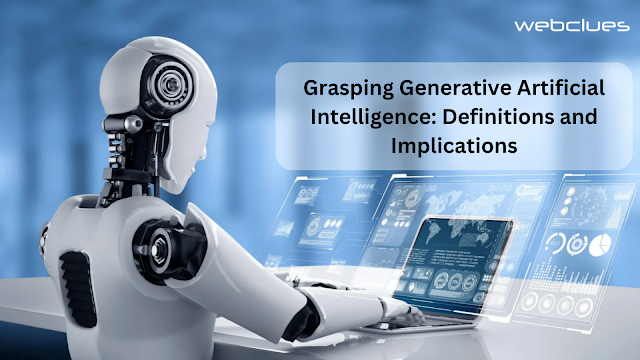Defining Generative Artificial Intelligence
Generative AI refers to AI models and algorithms designed to generate new data that resembles a given dataset. At the heart of Generative AI lies the concept of generating novel content that exhibits characteristics similar to the original dataset it was trained on. This process is often achieved through deep learning techniques, particularly Generative Adversarial Networks (GANs), Variational Autoencoders (VAEs), and autoregressive models.
GANs, introduced by Ian Goodfellow and his colleagues in 2014, consist of two neural networks: a generator and a discriminator. The generator creates synthetic data samples, while the discriminator tries to distinguish between real and generated samples. Through an adversarial training process, both networks improve iteratively, resulting in the generation of increasingly realistic data.
VAEs, on the other hand, learn a probabilistic distribution of the input data and then generate new samples by sampling from this distribution. This approach enables VAEs to capture the underlying structure of the data and generate diverse outputs.
Autoregressive models, such as Transformers, generate sequences of data by modeling the conditional probability of each element given the previous elements. These models have achieved remarkable success in natural language processing tasks and have been applied to generate text, code, and other sequential data.
Implications of Generative AI
Creativity and Innovation
Generative AI has profound implications for creativity and innovation across various domains. By autonomously generating new content, it can assist artists, designers, and writers in exploring new ideas and pushing the boundaries of their respective fields. For example, Generative AI systems can generate artwork, design prototypes, and even compose music, providing inspiration and augmenting human creativity.
Content Creation and Personalization
In the era of digital media, content creation and personalization have become paramount. Here, the concept of “What is Generative Artificial Intelligence?” becomes relevant. Generative AI, a cutting-edge technology, enables the automated creation of content tailored to individual preferences and interests. It’s like having a personal artist or writer at your disposal. Whether it’s generating personalized news articles, recommending products based on user behavior, or creating customized avatars in virtual environments, Generative AI is enhancing user experiences by delivering relevant and engaging content.
Synthetic Media and Misinformation
While Generative AI offers numerous benefits, it also raises concerns about the proliferation of synthetic media and misinformation. With the ability to generate highly realistic images, videos, and audio recordings, Generative AI can be exploited to create fake news, forged documents, and deceptive content. Addressing these challenges requires robust detection mechanisms and ethical guidelines to mitigate the spread of misinformation and preserve trust in digital media.
Data Augmentation and Simulation
Generative AI can augment datasets by generating synthetic samples, thereby enhancing the performance of machine learning models, especially in scenarios where labeled data is scarce. Additionally, Generative AI facilitates simulation and modeling of complex systems, enabling researchers to study phenomena that are difficult or impractical to observe in the real world. From simulating climate patterns to modeling biological processes, Generative AI contributes to scientific discovery and decision-making.
Ethical and Societal Implications
The rapid advancement of Generative AI poses ethical and societal implications that warrant careful consideration. Issues such as data privacy, algorithmic bias, and the displacement of human labor require proactive measures to ensure the responsible development and deployment of Generative AI technologies. Moreover, the democratization of AI tools raises questions about accessibility, accountability, and the equitable distribution of benefits and risks across society.
Conclusion
Generative Artificial Intelligence represents a paradigm shift in AI research and applications, offering unprecedented capabilities for content generation, creativity, and innovation. However, its widespread adoption also brings forth challenges related to misinformation, data ethics, and societal impact. By fostering interdisciplinary collaboration and ethical stewardship, we can harness the potential of Generative AI to drive positive change while addressing its associated risks. As we navigate the evolving landscape of AI, understanding and grappling with Generative AI will be essential for shaping a future that is both technologically advanced and ethically sound. Interested in learning more about this transformative technology? At Webclues Infotech, we’re at the forefront of AI research and development. Contact us today to explore how Generative AI can benefit your business. And if you’re wondering, “What is Generative Artificial Intelligence?” we’re here to answer all your questions.


0 Comments